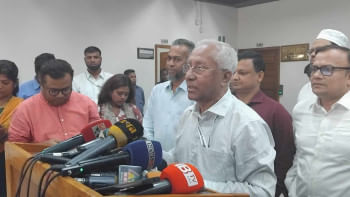Bail denial under EPR illegal
The High Court yesterday declared illegal and void some provisions of the Emergency Powers Ordinance (EPO), 2007 and Emergency Power Rules (EPR), 2007 that deny some rights including that to obtain bail in cases filed under these provisions and rules.
The HC declared illegal the provisions suspending HC jurisdiction to stay the convictions handed down by the trial courts against the accused during proceeding of the appeals and the rights of the people to move to the courts against the government actions under the ordinance and rules.
The court also cancelled the provisions empowering the Anti-Corruption Commission (ACC) to transfer the cases filed under the EPR to other courts.
After holding a long hearing on a writ, the HC bench of Justice ABM Khairul Haque and Justice Md Abdul Hye delivered the judgement.
The lawyers said the accused can now move to the courts for bail in the cases filed under EPR. The HC can grant bail to the accused during proceedings of the cases and stay the conviction against the accused during the pending of the appeals following yesterday's verdict.
They said the accused can get these facilities unless the Supreme Court stays the HC judgement.
The lawyers said the HC declared illegal the provisions and rules on grounds that the delegated authorities cannot restrict the peoples' rights to access to the court for bail, though granting bail to the accused is the discretion of the court.
Counsel for the petitioners Barrister M Amir-Ul Islam and Barrister Shamsuddin Chowdhury Manik, an amicus curea (friend of the court) of this case, said the Constitution has empowered the HC to consider the bail prayers of the accused and these powers cannot be curtailed by enacting any laws.
The EPO 2007 and EPR 2007 are not beyond the Constitution and those went beyond the Constitutional limits, they said.
The president promulgated the EPO, 2007 on January 12, 2007 aiming at ensuring security of the state and its people, protecting law and order and keeping economic activities unhindered.
In light of the ordinance, the caretaker government issued the EPR on January 13.
On June 5, former caretaker government adviser and Ain o Salish Kendra Executive Director Sultana Kamal, New Age Editor Nurul Kabir and Dhaka University Assistant Professor Sheikh Hafizur Rahman Karzon jointly filed the petition as public interest litigation with the HC challenging legality of the EPO sections 3 (Kha) and 5 and the EPR rules 11 (3), 19 (Gha), 19 (Uma).
The petitioners said these provisions are against the fundamental structure of the country's constitution and suffer from "unreasonableness and bad faith".
Attorney General Salauddin Ahmed argued for the government.

 For all latest news, follow The Daily Star's Google News channel.
For all latest news, follow The Daily Star's Google News channel. 



Comments